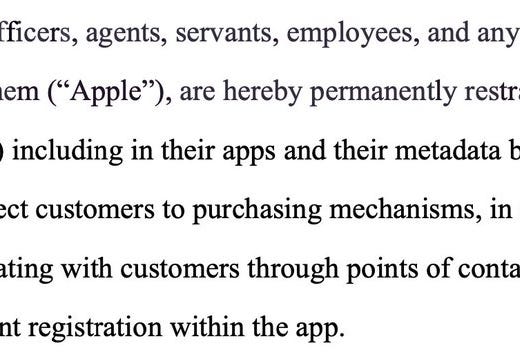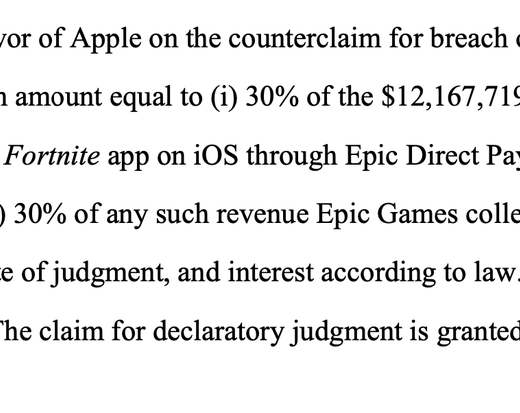Epic Games versus Apple
News Roundup #2: Why $475 to see a $69M JPEG might be worth it, TikTok and MTV partner, Lady Gaga out-streamed by sleep music, and more.
Welcome to Appetite for Distraction, a newsletter exploring how technology is bridging the gap between art and commerce.
Thanks so much for subscribing, and please tell a few friends if you’d like!
— Yash
Quick note before we start: I’ll be offline for 2 weeks starting on the 20th of September to the 1st of October. The next issue of AfD will be published on the 5th of October!
Epic Games versus Apple
Apple and Epic Games (the developer of Fortnite) have been embroiled in a long and highly publicised antitrust battle against Apple’s restrictive App Store policies. These policies not only affect app developers, but also creators who depend on those same apps.
Ever wondered why you can’t pay for a premium subscription directly through the Spotify app on your iPhone? Well, read on.
A few months ago, I co-wrote an essay with Li Jin and Nathan Baschez about how Apple is Holding Back the Creator Economy:
Apple is a product company. They famously obsess over details, and want every element of the user experience to be perfect. They require total control, because it allows them to use their taste to make choices that are frustrating at first for users (like removing the headphone jack) but then turn out later to be prescient and perhaps even courageous. There’s no question, they make the best products, and they extract a steep price for them.
But iOS is a platform. And the habits you acquire by being a good product company do not always help to run a platform effectively. Too much control, taste, and value extraction can break a platform. These three principles served iOS well in the early days when the platform was nascent and needed to be hand-nurtured. But now that the iPhone is ubiquitous, the App Store has become part of the basic infrastructure of the internet. And many of its policies around in-app purchases and tightly controlled App Store curation are not well-suited—and in fact harm—the broader ecosystem.
We’re not the first to critique Apple’s policies. But most debates about Apple center on the harm they cause to developers, and instead we think the far larger impact is on creators: the millions of people that could be earning more money and connecting with their fans.
Specifically, we take issue with:
Requiring all payments for digital content to use Apple’s in-app purchase system (IAP)
Their 30% take rate on IAP
Their $999 price cap on IAP
Too much intermediation of the relationship between buyers and sellers
Restrictive, inconsistent norms on what kinds of apps are allowed in the store
The creator economy has grown massively in the past few years, but what we see today is actually just a small slice of what the creator economy could be if Apple were not stymying its growth. Apple’s gatekeeper status is holding back the growth of the creator economy. Without Apple’s policy restrictions, there’s an entire universe of creators—including those who aren’t participating in the creator economy—that could flourish on iOS in ways we’ve never seen.”
Last week’s judgement might have changed that, but only slightly. Two main takeaways from the 185 page judgement were:
Apple will now have to let companies include links and/or buttons that direct users to their own payment mechanisms independent of Apple’s infrastructure for in-app purchases. (where they take a 30% of all revenue)
Apart from the above, the court ruled that Apple was not monopolistic, or acting in contravention of Antitrust laws. This means Epic Games has to pay Apple 30% of the $12.6 million that it collected from Fortnite’s iOS users.
Adi Robertson from The Verge has a great tl;dr on Twitter:
Related Reading:
Old World, Meet New World—TikTok and MTV Introduce Trending: VMAs
TikTok and MTV partnered to introduce Trending: VMAs, acknowledging the growing influence of TikTok on the music industry. They introduced 5 new categories:
Best Artist x Creator Collab
Best Viral Dance
Best Audio Mashup
Best Comeback Song
Best paired with:The Music Industry and Creator Economy Are Colliding: Analysing Addison Rae’s New Release
China’s New Laws Restrict the Monetization of Fandom
The Chinese government recently enacted a 10 point policy to limit “irrational star-chasing” effectively prohibiting the excessive commodification of fandom.
These laws are set to drastically affect the Chinese entertainment sector, which depends on the monetization of parasocial relationships. Tencent Music for example, derives two thirds of its revenue from in-app tipping, and other fandom related revenue streams.
Best paired with: Mark Mulligan’s analysis on the oncoming fandom crisis in China.
Weird (but unsurprising) Musonomics
Sleep Fruit Music, a company that releases 30 second ambient music (Rain sounds, for eg) to aid sleeping, is registering more streams than Lady Gaga.
Well played Sleep Fruit Music—but I can’t help thinking about what their success says about us:
The fact that we need digitally produced nature sounds to coax our monkey minds into sleeping is a sobering thought. (Although, it's hard to be self righteous as I write this listening to a Spotify playlist with Brown Noise)
Why Buying a $475 Ticket to See a $69 Million JPEG is Worth It
In November, we can all witness the first authorized public projection of The First 5000 Days, a digital artwork created by Beeple, which was sold for $69 million earlier this year.
Tickets to view the JPEG will be sold as $475 NFTs. And it might just be worth the money. Why would someone pay $475 to view something that can be viewed online at this very moment?
Because NFTs are rarely about the content. They are about the community. Anybody who is willing (and able) to pay $475 to see a $69 million JPEG is probably worth meeting.
The same can be said about some of the other hyped NFTs: Buying a pixelated CryptoPunk for upwards of 23 ETH (~$80,000) gives you access to a community of individuals who have the willingness and ability to pay the same.
It’s expensive signalling, just like important execs taking private jets to meet clients (instead of just sending a Zoom link). We are social animals, and signals are very important. Intrigued? check out Rory Sutherland’s interview with Shane Parrish.
Twenty One Pilots are Hosting a Concert on Roblox
Warner Music is fully leveraging their investment (and consequent partnership) with Roblox, with an in-game concert for Twenty One Pilots.
I wrote about how Roblox is a potent promotional channel because it enables context-based consumption:
“Roblox’s link to pop culture has set it up to be a powerful promotional channel for the music industry. ‘Dance Monkey’ is this year’s second most streamed song on Spotify. Younger fans prefer entertainment as a non-linear, collaborative experience rather than a linear, prescriptive imposition. Let’s unpack this — A legacy promotional channel like Instagram uses a linear feed and campaign success is based on impressions and click-through rates. In a non-linear promotional channel like Roblox, the music consumption experience is a contextual one. And Roblox can potentially power infinite contexts. Instead of giving fans a glimpse of their work, artists can invite fans into their world.”
Vox Media Acquired Hotpod
Hotpod, a paid newsletter dissecting the growing podcast industry, has now been acquired by The Verge, a tech-focussed media property owned by Vox Media.
Hotpod was founded in 2014 by Nick Quah, with a monthly $7 subscription for podcasting industry news and analysis.
The acquisition signals a growing interest from Vox Media to experiment with paid publishing models, says media analyst Mark Stenberg.
Kanye Crowdsourced Creativity for Donda via Discord
Kanye’s producer Mike Dean used a popular Discord Server with Kanye’s fans, WestServerEver to test out different variations of upcoming music. Alex Hern from the Guardian figures out why; and what makes Discord such a potent tool for community building.
LinkedIn Launches a $25 million Creator Fund
LinkedIn, the not-so professional network with a very weird alternate universe (aka Hustle Pornhub) has now launched a $25 million creator fund.
The fund includes a $15,000 grant with a 10 week accelerator program that will help creators with coaching, networking, and features on LinkedIn marketing.
David Dobrik Gets His Own Travel Show on Discovery+
David Dobrik, a celebrity creator with 18.3 million YouTube subscribers, will be launching a 10-part travel series on Discovery+, set to air later this year.
Canva Raises $200 million at a $40 billion valuation
Canva, an Australian company that has made aesthetically impaired individuals such as myself seem like talented but inexperienced designers, recently raised a $200 million funding round, valuing the company at $40 billion.
The valuation really underscores the importance of democratizing creation. (not to be confused with creativity, which still needs to be honed!)
Reading List
Clive Davis at 89: Whitney Houston, NYC Show, and Why He Won't Retire | Amy X. Wang, Rolling Stone
Why Go to Live Shows? Music Tomorrow’s Report on 17 Factors of Attendance in the Live Industry | Dmitry Pastukhov, Music Tomorrow
Olivia Rodrigo, Paramore, and the murky tides of copyright infringement | Kirbie Johnson, Dazed
The Reality of NFT Royalties | The Cadence
OpenSea CEO Says Era of ‘Pure Collectible NFTs’ Is Over | Kaya Yurieff, The Information
What I’m Listening To
If You’ve Made It This Far..
You can make it all the way.
What I’m Brewing — Sidama-Bensa de Etiopia from Tallat Coffee
Thank you so much for reading! If you want to get in touch, you can respond directly to this email or reach out on Twitter. Always excited to meet like-minded humans!
Until next week,
— Yash




